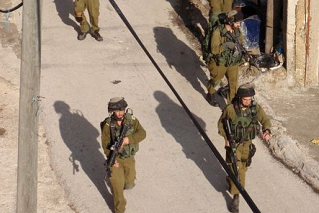 Soldiers in Awarta. Photo: Public domain via Wikimedia Commons.
Soldiers in Awarta. Photo: Public domain via Wikimedia Commons.On 11 April 2011, the Turkel Commission was presented with expert testimonies by ACRI and other Israeli human rights organizations, as well as by the Military Judge Advocate General.
The Commission, set up by the Israeli government following the events of the Gaza Flotilla, has also been authorized to examine whether the current inquiry mechanism of alleged violations of international law meets Israel’s obligations. Following Operation Cast Lead, ACRI, together with seven other human rights organizations, demanded that Israel set up an independent investigation body. Such a body was never established.
Attorney Limor Yehuda of the Association for Civil Rights in Israel (ACRI), who testified before the commission, said in her testimony: “The obligation to investigate is not only a legal obligation, but also a moral responsibility toward those citizens who were harmed and toward soldiers sent to battle on behalf of the country, and it is essential for preventing future harm to innocent civilians. The existing investigation mechanism into alleged wrongdoings of the military is insufficient and must be changed in order to uphold international law. We urge the committee to recommend that the government set up a permanent independent inquiry body that will ensure investigations are conducted effectively, professionally, and with transparency”.
On April 6 – just days before the planned session of the Turkel Commission – the Military Judge Advocate General announced that in light of the relative calm in the West Bank, the army will reinstate the pre-Second Intifada policy of launching a Military Police Investigation whenever reasonable doubt arises.
The announcement was made as an updated statement to the High Court of Justice in the framework of a petition submitted on this matter by B’Tselem and ACRI in 2003. The organizations deem the change of policy as insufficient, since renewed security tension could lead to the policy’s reversal and once again killings of civilians will not be investigated.
Summary of ACRI’s Recommendations to Turkel Commission
- ACRI calls to launch a Military Police Investigation whenever reasonable suspicion arises that a Palestinian was killed by the military, excluding cases defined as “hostile terrorist activity”. This has been the customary practice until the outbreak of the second Intifada in September 2000, when the policy was changed and a Military Police Investigation became the exception to the rule rather than the norm.
- ACRI calls to set up an independent body that will conduct initial investigation when suspect arises, replacing the policy to rely on “operational inquiries” carried out internally by the unit responsible for the suspected killing. These inquiries, which focus on operational procedures alone, are carried out by field officers, who are not trained investigators, authorizing them to decide whether the soldiers of their own unit will be criminally charged. Experience here and abroad has shown that internal inquiries may be swayed due to irrelevant considerations, for example a desire to protect the suspect soldiers. Given their nature and the manner in which they are conducted, operational inquiries are clearly not an effective, thorough, professional and independent method of investigation.
- ACRI appeals to authorize the new investigation body to probe cases in which there could be a personal or institutional conflict of interest on behalf of the Military Judge Advocate General and the Military Advocate General Corps. The Advocate General personnel and the Military Judge himself provide the military with legal advice during stages of decision-making, and therefore a conflict of interest arises when investigation is launched into the legality of these orders.
- ACRI argues that a civilian supervising body must be in place to closely oversee military investigation, and not leave things as an internal discussion that can be carried out away from the public eye. This will also assist guaranteeing that professional experience and tools are the basis of all investigations.







